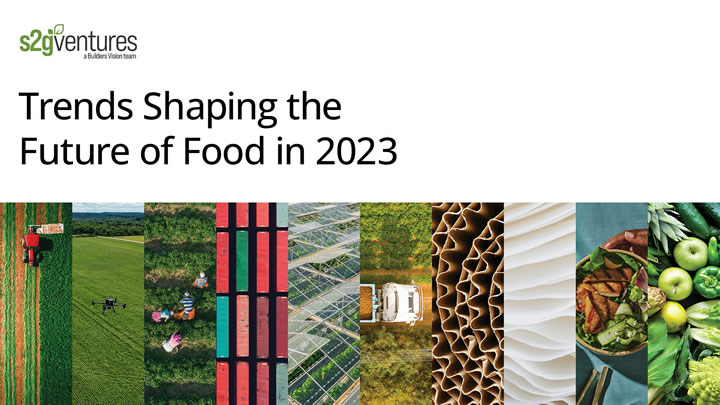S2G Ventures' Annual Report Unveils Trends Shaping the Future of Food & AgTech in 2023

S2G Ventures, a leading multi-stage investment firm focused on the food, agriculture, ocean and clean energy markets, has released its second annual report highlighting the Food and AgTech trends shaping the future of food in 2023.
The future of food is being propelled by seismic tailwinds: massive demographic change spurring new consumer demand, significant advancements in the biology, chemistry and physics of food production to create new choices, and sustainability-minded investors fueling a desire across capital markets to fund high-growth, disruptive companies. Due to continuous volatile shifts in externalities including the pandemic, war in Ukraine and increase in climate-related events, the risks inherent in our food system are increasing and getting more entangled. If left unchecked, these risks will intensify due to the alarming impact on our most important resources.
As a result, S2G Ventures believes that the food system evolution will require a shift to working with nature instead of against it and must leverage the power of science, technology and entrepreneurship to move forward. S2G Ventures' report, "Trends Shaping the Future of Food in 2023," explores the trends that are driving the transition to a climate-smart, healthy food system. The trends fall into three categories: Farmers Scale Climate-Smart Practices, Supply Chain Resilience Improves Food Security, and Consumers Demand Healthy, Sustainable Food Choices.
"The approaching bear market will impact the trajectory of the food system transition, applying cost, margin and financing pressures to companies across the sector. At the same time, this uncertain macro environment may fuel growth for some companies offering more sustainable solutions that are also cheaper, faster, better and more resilient than their traditional analogs," said Sanjeev Krishnan, senior managing director and chief investment officer at S2G Ventures. "While the world's economies may see a slow down in 2023, those companies that can execute well and maintain funding levels needed to ride out the downturn may emerge stronger and well positioned to bring significant positive change to the food system."
Farmers Scale Climate Smart Practices
Increased external pressures from labor shortages, environmental degradation, climate change, and consumer demand for sustainable products are pushing farmers to adopt automation, digital technologies and alternative inputs.
- Robotics will be deployed on farms at a commercial scale.
- Digital technologies will enable profitable, climate-smart farming on land and at sea.
- Nascent input technologies will become mainstream.
Supply Chain Resilience Improves Food Security
- Optimization and decentralization of supply chains, as well as food waste solutions, can help solve food system inefficiencies and build greater resiliency for society and the economy in the face of future shocks.
- Supply chain optimization technologies can reduce costs, emissions, and risk.
- Controlled production will improve food security and system resilience.
- Adoption of food waste solutions will be recognized as both a good business practice and an essential tool for feeding the world.
Consumers Demand Healthy, Sustainable Food Choices
Consumer expectations for foods that can deliver excellent flavor, meet sustainability standards, and support their health goals are driving an evolution in plant-based and cultivated proteins, wellness products and technologies, and packaging.
- Innovative packaging and closed-loop recycling will begin to address our plastics problem.
- Novel ingredients will enable the next generation of plant-based foods.
- Cultivated protein will provide consumers around the world with safe, sustainable food.
- Food will become central to the effort to prevent chronic disease and improve health outcomes.
To read the full report, please download at https://www.s2gventures.com/reports.
Comments (0)
This post does not have any comments. Be the first to leave a comment below.
Featured Product


